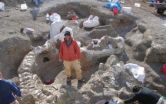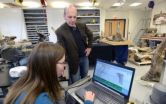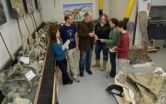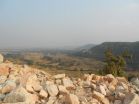(Press-News.org) Scientists have discovered and described a new supermassive dinosaur species with the most complete skeleton ever found of its type. At 85 feet long and weighing about 65 tons in life, Dreadnoughtus schrani is the largest land animal for which a body mass can be accurately calculated.
Its skeleton is exceptionally complete, with over 70 percent of the bones, excluding the head, represented. Because all previously discovered super-massive dinosaurs are known only from relatively fragmentary remains, Dreadnoughtus offers an unprecedented window into the anatomy and biomechanics of the largest animals to ever walk the Earth.
"Dreadnoughtus schrani was astoundingly huge," said Kenneth Lacovara, an associate professor in Drexel University's College of Arts and Sciences, who discovered the Dreadnoughtus fossil skeleton in southern Patagonia in Argentina and led the excavation and analysis. "It weighed as much as a dozen African elephants or more than seven T. rex. Shockingly, skeletal evidence shows that when this 65-ton specimen died, it was not yet full grown. It is by far the best example we have of any of the most giant creatures to ever walk the planet."
Lacovara and colleagues published the detailed description of their discovery, defining the genus and species Dreadnoughtus schrani, in the journal Scientific Reports from the Nature Publishing Group today. The new dinosaur belongs to a group of large plant eaters known as titanosaurs. The fossil was unearthed over four field seasons from 2005 through 2009 by Lacovara and a team including Lucio M. Ibiricu of the Centro Nacional Patagonico in Chubut, Argentina; the Carnegie Museum of Natural History's Matthew Lamanna, and Jason Poole of the Academy of Natural Sciences of Drexel University, as well as many current and former Drexel students and other collaborators. These included three current NSF Graduate Research Fellows--current GRF Kristyn Voegele, and former GRFs Elena Schroeter and Paul Ullmann--all co-authors of this paper.
"The quality of this specimen has allowed us to study this new species in numerous aspects giving us closer to a holistic view than is possible for most dinosaur species," said Voegele. "This could only be accomplished by collaborating with multiple experts--and without this collaboration our knowledge of this taxon would be fragmentary and not live up to the completeness and quality of the specimen. The NSF GRFP has enabled myself and two fellow collaborators to preform detailed analyses of this new species."
"The fellowship awarded in 2013 acknowledged Kristyn's scientific potential, and supports her contributions to this exciting discovery," said Gisele Muller-Parker, program director for the Graduate Research Fellowship Program. "In addition to her research on dinosaur anatomy and biomechanics, Kristyn has been involved in a variety of related outreach activities, including an annual Community Dig Day and a Fossil Discovery Station for school visits at a fossil site in New Jersey."
INFORMATION:
NSF funding also included an Earth Sciences award of the Geobiology and Low-Temperature Geochemistry program.
For more information on this research, please go to the Drexel press release.
-NSF-
T. rex times 7: New dinosaur species is discovered in Argentina
Drexel researchers uncover immense, remarkably complete dinosaur skeleton; research team includes three NSF Graduate Research Fellows
2014-09-04
ELSE PRESS RELEASES FROM THIS DATE:
INFORMS study: Customer experience matters more when economy is doing better, not worse
2014-09-04
Customer experience matters more when the economy is doing well than when it is doing poorly, according to a new study in the Articles in Advance section of Marketing Science, a journal of the Institute for Operations Research and the Management Sciences (INFORMS).
The study, entitled "Assessing the Influence of Economic and Customer Experience Factors on Service Purchase Behaviors" is by V Kumar, the Regents' Professor, Nita Umashankar, an assistant professor, and PhD candidates Hannah Kim and Yashoda Bhagwat, all at Robinson College of Business at Georgia State University. ...
The Lancet: International health systems fund could have averted Ebola outbreak
2014-09-04
The Ebola crisis in west Africa could have been averted if governments and health agencies had acted on the recommendations of a 2011 World Health Organisation (WHO) Commission on global health emergencies, according to a new Comment, published in The Lancet.
The Comment, written by Professor Lawrence Gostin, Faculty Director of the O'Neill Institute for National & Global Health Law at Georgetown University, USA, calls for renewed international commitment to a health systems contingency fund to prevent another infectious disease crisis, together with long-term funding ...
2014 Breast Cancer Symposium highlights research advances in prevention, screening, therapy
2014-09-04
ALEXANDRIA, Va. – Five studies from the 2014 Breast Cancer Symposium were highlighted today in an embargoed presscast for reporters. Presentations focused on new studies exploring preventive mastectomy, compliance with recommended screening mammography, and risk of recurrence after pre-surgery therapy for breast cancer. The Symposium will take place September 4-6, 2014, at the San Francisco Marriott Marquis in San Francisco, CA.
Five major studies were highlighted in today's presscast:
Angelina Jolie's Story May Have Helped Double BRCA Testing Rates at a Canadian Cancer ...
Messenger molecules identified as part of arthritis puzzle
2014-09-04
The way in which some cells alter their behaviour at the onset of osteoarthritis has been identified for the first time by researchers at the University of Liverpool.
The study was funded by medical research charity Arthritis Research UK.
The trigger for arthritis is still to be fully defined, but it is known that injuries, obesity or old age can all increase the risk for arthritis, and lead to cells in the affected joint altering their behaviour.
The research team from the University's Institute of Ageing and Chronic Disease has now found that changes in the rate ...
Researcher advances a new model for a cosmological enigma -- dark matter
2014-09-04
LAWRENCE — Astrophysicists believe that about 80 percent of the substance of our universe is made up of mysterious "dark matter" that can't be perceived by human senses or scientific instruments.
"Dark matter has not yet been detected in a lab. We infer about it from astronomical observations," said Mikhail Medvedev, professor of physics and astronomy at the University of Kansas, who has just published breakthrough research on dark matter that merited the cover of Physical Review Letters, the world's most prestigious journal of physics research.
Medvedev proposes a ...
Atomically thin material opens door for integrated nanophotonic circuits
2014-09-04
A new combination of materials can efficiently guide electricity and light along the same tiny wire, a finding that could be a step towards building computer chips capable of transporting digital information at the speed of light.
Reporting today in The Optical Society's (OSA) high-impact journal Optica, optical and material scientists at the University of Rochester and Swiss Federal Institute of Technology in Zurich describe a basic model circuit consisting of a silver nanowire and a single-layer flake of molybendum disulfide (MoS2).
Using a laser to excite electromagnetic ...
Trinity geologists re-write Earth's evolutionary history books
2014-09-04
Geologists from Trinity College Dublin have rewritten the evolutionary history books by finding that oxygen-producing life forms were present on Earth some 3 billion years ago – a full 60 million years earlier than previously thought. These life forms were responsible for adding oxygen (O2) to our atmosphere, which laid the foundations for more complex life to evolve and proliferate.
Working with Professors Joydip Mukhopadhyay and Gautam Ghosh and other colleagues from the Presidency University in Kolkata, India, the geologists found evidence for chemical weathering of ...
Study: Oxidized LDL might actually be 'good guy'
2014-09-04
LEXINGTON, Ky (Sept. 4, 2014) -- A team of investigators at the University of Kentucky has made a thought-provoking discovery about a type of cholesterol previously believed to be a "bad guy" in the development of heart disease and other conditions.
Jason Meyer, a University of Kentucky MD-PhD candidate, worked with Deneys van der Westhuyzen, Ph.D., a Professor in the Departments of Internal Medicine and Molecular and Cellular Biochemistry, to study the role oxidized LDL plays in the development of plaque inside artery walls.
According to Meyer, the medical research ...
Research shows declining levels of acidity in Sierra Nevada lakes
2014-09-04
RIVERSIDE, Calif. — California's water supply depends on a clean snow pack and healthy mountain lakes. The lakes receive a large amount of runoff in the spring from the melting snowpack. If the snowpack is polluted, the lakes will be polluted.
James O. Sickman, an environmental scientist at the University of California, Riverside, has conducted research on lakes in the Sierra Nevada—the most sensitive lakes in the U.S. to acid rain, according to the Environmental Protection Agency—and described human impacts on them during the 20th century. The research was done by ...
New research offers help for spinal cord patients
2014-09-04
Many patients suffer from severe spinal cord injuries after being involved in traffic accidents or accidents at work. An injury to the spinal cord is a catastrophe for the individual, and often results in complete or partial paralysis of the person's arms and legs. Despite the paralysis, several patients experience problems with involuntary muscle contractions or spasms which impair the patient's quality of life.
The movements are due to the neurotransmitter serotonin, which normally plays a crucial role in relation to our voluntary control of movements by reinforcing ...
LAST 30 PRESS RELEASES:
Microbe exposure may not protect against developing allergic disease
Forest damage in Europe to rise by around 20% by 2100 even if warming is limited to 2°C
Rapid population growth helped koala’s recovery from severe genetic bottleneck
CAR-expressing astrocytes target and clear amyloid-β in mouse model of Alzheimer’s disease
Unique Rubisco subunit boosts carbon assimilation in land plants
Climate change will drive increasing forest disturbances across Europe throughout the next century
Enhanced brain cells clear away dementia-related proteins
This odd little plant could help turbocharge crop yields
Flipped chromosomal segments drive natural selection
Whole-genome study of koalas transforms how we understand genetic risk in endangered species
Worcester Polytechnic Institute identifies new tool for predicting Alzheimer’s disease
HSS studies highlight advantages of osseointegration for people with an amputation
Buck Institute launches Healthspan Horizons to turn long-term health data into Actionable healthspan insights
University of Ottawa Heart Institute, the University of Ottawa and McGill University launch ARCHIMEDES to advance health research in Canada
The world’s largest brain research prize awarded for groundbreaking discoveries on how we sense touch and pain
Magnetofluids help to overcome challenges in left atrial appendage occlusion
Brain-clearing cells offer clues to slowing Alzheimer’s disease progression
mRNA therapy restores fertility in genetically infertile mice
Cloaked stem cells evade immune rejection in mice, pointing to a potential universal donor cell line
Growth in telemedicine has not improved mental health care access in rural areas, study finds
Pitt scientists engineer “living eye drop” to support corneal healing
Outcomes of older adults with advanced cancer who prefer quality of life vs prolonging survival
Lower music volume levels in fitness class and perceived exercise intensity
Of crocodiles, counting and conferences
AERA announces 2026 award winners in education research
Saving two lives with one fruit drop
Photonic chips advance real-time learning in spiking neural systems
Share of migratory wild animal species with declining populations despite UN treaty protections worsens from 44% to 49% in two years; 24% face extinction, up 2%
One in 20 babies experiences physical abuse, global review finds
Tundra tongue: The science behind a very cold mistake
[Press-News.org] T. rex times 7: New dinosaur species is discovered in ArgentinaDrexel researchers uncover immense, remarkably complete dinosaur skeleton; research team includes three NSF Graduate Research Fellows






